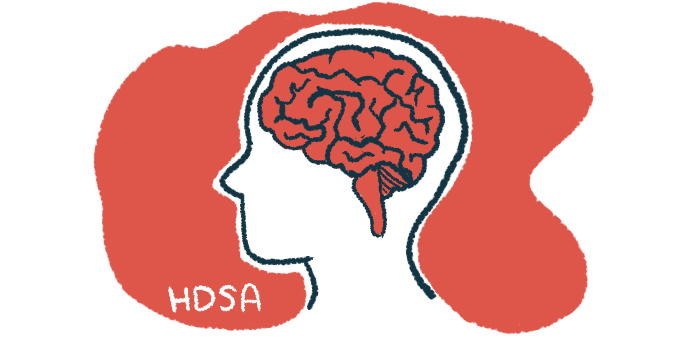HDSA 2025: Speech therapy can help Huntington’s disease patients
Therapist says strategies learned can improve swallowing, communication

Speech therapy can help people with Huntington’s disease reduce swallowing problems, communicate better, and manage cognitive difficulties.
That was the message of a live-streamed talk, given by a speech therapist — also known as a speech-language pathologist or SLP — at the 40th annual convention of the Huntington’s Disease Society of America (HDSA), held June 26-28 in Indianapolis.
Becky Gerig, an SLP at Indiana University’s HDSA Center of Excellence, discussed the role of speech therapy in Huntington’s disease, known as HD for short, during the interactive session. The 45-minute talk was titled “The Role of the Medical SLP in HD.”
Huntington’s is a neurodegenerative disease affecting an estimated 30,000 people in the U.S. and about 2.7 per 100,000 individuals worldwide.
As it progresses, many HD patients develop swallowing difficulties, known as dysphagia, speech problems, or dysarthria, and cognitive impairments. Gerig noted that speech therapy can help with all three.
According to Gerig, many people with Huntington’s disease often aren’t aware of when they’re having swallowing difficulties. As such, it’s crucial for patients to be openly communicating with their families and loved ones who see them eat, so that any concerns can be voiced without judgment.
Aspiration is key issue for Huntington’s patients
Swallowing occurs in three main phases, starting with the oral phase, in which food is chewed or felt in the mouth. The second or pharyngeal phase occurs when food moves back into the throat. Involuntary processes are in place to prevent anything other than air from entering the airway, Gerig noted. The third and final step, known as the esophageal phase, is when food moves into the stomach pipe.
People with Huntington’s can experience issues in all of these stages, from not chewing enough to having trouble with the brain-muscle communication that coordinates the involuntary movements needed to prevent choking and aspiration.
“Aspiration means anything other than your air entering your airway, like food, water, sometimes vomit,” Gerig said. “It doesn’t matter what it is; if it’s not air and it enters the airway, we call that aspiration.”
Signs of aspiration include persistent coughing at meals, fever, and trouble breathing. In some cases, aspiration can lead to aspiration pneumonia — a lung infection caused by aspiration — which is one of the leading causes of death for people with Huntington’s, Gerig noted.
According to the therapist, being less physically active and having poor oral hygiene are two major risk factors for aspiration pneumonia.
“The best two things you could do to decrease your risks of aspiration [pneumonia] are staying physically active as long as you can and keeping that mouth clean,” Gerig said.
For patients with dysphagia, start with a swallow study
For people with dysphagia, the first step in treatment typically is a swallow study, Gerig said. In such testing, clinicians use X-rays or other imaging techniques to track how food moves through the mouth, throat, and stomach pipe while a person swallows.
During the swallow study, clinicians can also evaluate the effectiveness of simple modifications — sometimes sitting up straight or tucking the chin can help normalize swallowing, she noted.
An investigational form of treatment for dysphagia in Huntington’s is expiratory muscle strength training, which uses a specialized device to strengthen the muscles needed to cough and remove blockages from the airways.
Gerig noted that there aren’t enough data yet to say for certain if this approach can reduce aspiration for Huntington’s patients. But at her clinic, she said, “we feel like it’s better to try it and use it, because it’s definitely not going to harm you.”
In some cases, it may be warranted for people with Huntington’s to start getting their nutrition via a feeding tube. Gerig recommended a book called Hard Choices for Loving People by Hank Dunn, which can help guide discussions on feeding tubes and other invasive procedures. She emphasized that “there is no right answer and there is no wrong answer. It’s just different for everyone.”
Regarding speech problems, such as slurring or lack of articulation, Gerig shared three main tips — which she called “speech dysarthria strategies” — that can help. The three: Talk louder, exaggerate mouth movements, and speak more slowly.
The key with talking louder, she noted, is not to shout, but to project and increase volume.
Increasing volume is often the most important tip, Gerig said, because people speaking loudly will tend to also exaggerate their mouth movements and speak more slowly.
“If you can just remember increasing that volume, I think you’ll find people … will stop asking you to repeat yourself,” Gerig said.
Speech therapy can provide communication strategies
In addition to working on speech itself, speech therapy may also provide other strategies to communicate, per Gerig. This can include everything from gestures or pointing at a board with “yes” and “no” written on it, to new high-tech strategies that use artificial intelligence to simulate a person’s voice. Working with a SLP can help identify the best strategies for each individual.
Speech therapists can also aid with strategies for Huntington’s-associated cognitive problems, Gerig noted.
“We really want to focus on what’s important to you,” Gerig said. “So if you’re somebody that’s like, ‘I want to still be as independent as I can, and I want to remember what my own medications are,’ we can help you with that.”
Tips for managing cognitive issues include reducing distractions when communicating important information and asking the person to repeat back what was said. It’s also often helpful for patients to use tools like calendars, to-do lists, visual aids, and alarms, Gerig said.
We really want to focus on what’s important to you [in speech therapy]. … So if you’re somebody that’s like, ‘I want to still be as independent as I can,’ … we can help you with that.
Huntington’s patients may also benefit from an evidence-based memory strategy, called WRAPS, which stands for writing, repeating, association, and picturing.
“Writing something down will help you remember because … you wrote it, and it’s sort of like filing that in your filing cabinet in your brain,” Gerig said. “The more you repeat something, the more you’ll remember it.”
In addition to relying on speech therapists, Gerig noted that it can be extremely helpful to attend support groups and engage with others in the Huntington’s community. This allows people to learn from each other and share what strategies they have found to be most helpful.
Note: The Huntington’s Disease News team is providing virtual coverage of the Huntington’s Disease Society of America June 26-28. Go here to see the latest stories from the conference.









